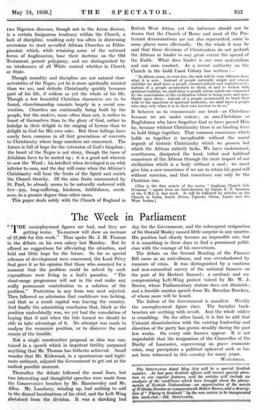The Week in Parliament T HE unemployment figures are bad, and
they are getting worse. To-morrow will show an increase of 27,000 for this week." Thus spake Mr. J. H. Thomas in the debate, on his own salary last Monday. But he offered no suggestions for alleviating the situation, and held out little hope for the future. So far as special schemes of development were concerned, the Lord Privy Seal gave it as his opinion that those who assumed for a moment that the problem could be solved by such expenditure were living in a fool's paradise. " The short-range programme will not in the end make any really permanent contribution to a solution of the problem." Protection in any form was next rejected. Then followed an admission that confidence was lacking, and that as a result capital was leaving the country. And finally the astonishing conclusion that, black as the position undoubtedly was, we yet had the consolation of hoping that if and when the tide turned we should be able to take advantage of it. No attempt was made to analyz,e the economic position, or to discover the root causes of the trorible. .
Not a single constructive proposal or idea was con- tained in a speech which in impotent futility surpassed anything that. Mr. Thomas has hitherto achieved. Small wonder that Mr. Kirkwood, in a spontaneous and legiti- mate outburst, adjured the Government to get out at the earliest possible moment.
Thereafter the debate followed the usual lines, but two interesting and thoughtful speeches were made from the Conservative benches by Mr. Hanunersley and Mr. Allen. Mr. Lansbury, winding up, had nothing to add to the dismal lucubrations of his chief, and the Left Wing Abstained from the division. It was a shocking bad day for the Government, and the subsequent resignation of Sir Oswald Mosley caused little surprise in any quarter. His position had clearly become an impossible one, but it is something in these days to find a prominent politi- cian with the courage of his convictions.
The debate on the Second Reading of the Finance Bill came as an anti-climax, and was overshadowed by rumours of crisis. It was distinguished by a cautious and non-committal survey of the national finances on the part of Sir Herbert Samuel ; a sardonic and un- compromising Left-Wing protest voiced by Mr. W. J. Brown, whose Parliamentary stature does not diminish ; and a forcible maiden speech from Mr. Brendan Bracken, of whom more will be heard.
The failure of the Govermnent is manifest. Weekly the unemployment figure rises. The Socialist back- benches are seething with revolt. And the whole edifice is crumbling. On the other hand, it is fair to add that Unionist dissatisfaction with the existing leadership and direction of the party has grown steadily during the past few weeks. On every side fissures appear. It is not improbable that the resignation of the Chancellor of the Duchy of Lancaster, supervening on grave economic crisis, may precipitate a political upheaval such as has not been witnessed in this country for many years.
WATCHMAN.






































 Previous page
Previous page